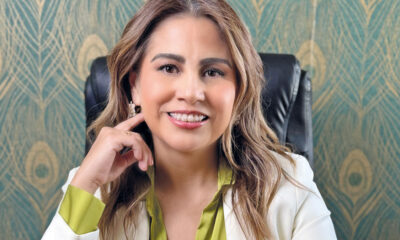Valores
La moral que se nos fue
Publicado
3 años antesel
Por
Lupita Navarro
Bajo el concepto de la ética debemos aprender a diferenciar lo bueno de lo malo y aplicarlo en nuestra vida cotidiana
¿Qué nos pasó a los seres humanos?
¿En qué momento dejamos de aplicar en nuestra vida social los códigos de la moral?
Desde antes de la era cristiana la ética ya existía como un modelo de conducta, ésta se define como “parte de la filosofía que reflexiona sobre lo que está bien o está mal”.
La moral es una norma de conducta universal que guía u orienta nuestra conducta, de este modo, podemos distinguir lo que es bueno de lo que no lo es, lo correcto de lo incorrecto.
Primero fue el Pentateuco (antiguo testamento) y luego la fe cristiana, la que vino a perfeccionar la conducta humana con la cual el hombre transitó por muchos siglos hasta llegar a dos experiencias de inmoralidad que fueron castigadas por Dios: el período previo al diluvio y la destrucción de Sodoma y Gomorra.
En ambos casos se advertía la desviación humana hacia una conducta contraria a las enseñanzas del creador.
En nuestros días, la práctica de la moral está sujeta a la interpretación humana y sus gobiernos. Ese desfase de falsos criterios de libertad, están erosionando la mente, la conciencia y la moral del hombre moderno; ahora a lo bueno lo llamamos malo y a lo malo lo consideramos bueno, como dice la misma Sagrada Escritura.
Por eso, la ética no debe de ser una simple rama de la filosofía, sino una genuina forma de vida que puede ser aplicada en nuestra vida cotidiana, en todos los actos, decisiones y comportamientos, bien sea en el trabajo, en los grupos religiosos, en los gobiernos, en los centros escolares, en la forma en que nos relacionamos con nuestros seres queridos o con las demás personas, así como en la relación con el medio ambiente.
Es gracias al respeto de todos estos principios y reglas que creamos las condiciones adecuadas para convivir en sociedad. La ética es ese deber moral innato en todo ser humano, es una conducta universal en la que el hombre coincide con una forma de conducta, aunque en muchos lugares la inmoralidad sea ya una forma de vida promovida por los gobiernos.
El fundamento de la ética queda establecido en las palabras del Señor Jesucristo: “Todo cuanto queráis que os hagan los hombres, así también haced vosotros con ellos” (Mateo 7:12).
La regla de la vida
Este precepto es la regla de la vida, que se compone por: Verdad, Justicia o Equidad y Bondad, por tanto, si la existencia de Dios es negada, entonces la moralidad y la ética automáticamente desaparecen; la conducta humana caería bajo la esclavitud de un relativismo moral interminable.
Allí quitarle la vida bajo anestesia a un niño de tres años porque sea paralítico (Eutanasia de hoy día), pudiera ser visto como un bien moral. Necesitamos, pues, una ética de valores morales absolutos, que regule la conducta recíproca de los hombres, o que mis deberes ciudadanos no sean establecidos por estadísticas que pueden ser manipuladas para probar cualquier cosa, sino por la verdad, equidad y compasión del carácter del creador.
The morale that has left us
Under the concept of ethics, we must learn to differentiate right from wrong and apply it in our daily lives.
What happened to us human beings?
At what point did we stop applying moral codes in our social life?
Before the Christian era, ethics already existed as a model of conduct; it is defined as “part of the philosophy that reflects on what is right or wrong.”
Morality is a universal standard of conduct that guides or orients our behavior; thus, we can distinguish what is good from what is not good and what is right from what is wrong.
First, it was the Pentateuch (Old Testament) and then the Christian faith, which came to perfect human conduct with which man went through many centuries until reaching two experiences of immorality that God punished: the period before the flood and the destruction of Sodom and Gomorrah.
In both cases, the human deviation toward conduct contrary to the creator’s teachings was noticed.
Nowadays, the practice of morality is subject to human interpretation and governments. This gap of false criteria of freedom is eroding the mind, conscience and morals of modern man; now we call good evil and evil we consider reasonable, as the Holy Scripture itself says.
Therefore, ethics should not be a superficial branch of philosophy, but a genuine way of life that can be applied in our daily lives, in all our actions, decisions and behaviors, whether at work, in religious groups, in governments, in schools, in the way we relate to our loved ones or other people, as well as in our relationship with the environment.
Thanks to respecting all these principles and rules, we create adequate conditions to live together in society. Ethics is moral duty innate in every human; it is universal conduct in which man coincides with a form of behavior. However, in many places, immorality is already a way of life promoted by governments.
The foundation of ethics is laid in the words of the Lord Jesus Christ: “All things whatsoever ye would that men should do to you, do ye even so to them” (Matthew 7:12).
The rule of life
This precept is the rule of life, which is composed of Truth, Justice, Fairness and Goodness; therefore, if the existence of God is denied, then morality and ethics automatically disappear; human behavior would fall under the bondage of an endless moral relativism.
There, taking the life of a three-year-old child under anesthesia because he has paralysis (today’s Euthanasia) could be considered a moral good. We need, then, an ethic of absolute moral values, which regulates the reciprocal conduct of men, or that my duties as a citizen are not established by statistics that can be manipulated to prove anything but by the truth, equity and compassion of the creator’s character.
Valores
‘Las mujeres se preparan mejor para tener una sociedad mejor’
Publicado
2 semanas antesel
01/07/2025Por
Luz María Sotelo
La abogada Sandra Ramona Velarde Vázquez platica a Visionarias sobre el trabajo social que realiza el Colegio de Abogadas A. C.
Si tienes un problema que amerite asesoría legal y la situación económica no te permita pagar un profesional que defienda tu causa, puedes acudir al Colegio de Abogadas A. C., donde te van a canalizar con el profesional adecuado para llevar tu caso.
Sobre como funciona dicho colegio, la abogada penalista Sandra Ramona Velarde nos cuenta que éste es una institución sin fines de lucro con 35 años de servicio, creado por unas mujeres expertas en Derecho que tenían la inquietud de ayudar a la sociedad en general con problemas de carácter legal.
El Colegio de Abogadas A. C. fue fundado en 1990 por la licenciada María de Jesús Carrera, a quien Velarde Vázquez describe como “una mujer muy aguerrida”. Junto con ella comenzaron la labor Juanita Quintero y Graciela de Arce, además de otras pioneras, que tenían la finalidad de ayudar a mujeres vulnerables.
Ese espíritu de servicio ha continuado con los años, por lo que ahora han ampliado las asesorías y brindan apoyos en asilos, psiquiátricos, el Cereso femenil, y otras instituciones.
Todo bajo su propio patrocinio, sin ayuda del Gobierno o cualquier otra institución.
Sandra nos cuenta que realizan diversas actividades para apoyar a los que menos tienen y acuden a la Feria de Servicios Profesionales, donde las mujeres pueden acercarse para platicarles su caso y entre todas buscar la solución al mismo. Por mes, nos cuenta que ayudan a alrededor de 100 mujeres diferentes.
Su experiencia
Para la licenciada Sandra Velarde la labor con las mujeres es de suma importancia, pues sabe que aún en esta época enfrentan situaciones en las que son vistas por debajo de los hombres, y en los juzgados no es la excepción.
Como abogada se ha enfrentado a la paridad de género, sobre todo cuando estaba embarazada y recuerda que antes daban prioridad a ellos, sin embargo, ahora tratan de dar carta abierta a todo mundo.
“Las mujeres van a pasos agigantados en la actualidad… anteriormente los mejores puestos se los llevaban los caballeros”, dice.
Es por esto último que lanza un importante mensaje, “todas las mujeres tenemos la capacidad de luchar por nuestros objetivos y nuestros sueños… Las mujeres tenemos una gran capacidad de trabajo y hacer muchas cosas, si tienes una meta en la mente no podemos decir ‘ya no puedo’… Las mujeres se preparan mejor para tener una sociedad mejor”, finaliza.

“Women Prepare Better to Build a Better Society”
Attorney Sandra Ramona Velarde Vazquez speaks to Visionarias about the social work carried out by the Colegio de Abogadas A.C.
If you’re facing a legal issue and can’t afford to pay for professional legal help, you can turn to the Colegio de Abogadas A.C., where they’ll connect you with the right professional to take on your case.
Criminal lawyer Sandra Ramona Velarde explains that this nonprofit organization, founded 35 years ago, was created by a group of women experts in law who felt compelled to help the broader community with legal problems.
The Colegio de Abogadas A.C. was founded in 1990 by attorney Maria de Jesus Carrera, whom Velarde Vazquez describes as “a very fierce woman.” She began the initiative alongside Juanita Quintero and Graciela de Arce, as well as other pioneering women who set out to support vulnerable women.
That spirit of service has carried on through the years. Today, their support extends beyond legal advice: they now offer aid in nursing homes, psychiatric institutions, the women’s correctional facility (Cereso femenil), and other institutions.
All of this is done on their own funding, with no assistance from the government or any other institution.
Sandra shares that they engage in various activities to support those in need, including participating in the Professional Services Fair, where women can approach them to share their cases and work together to find a solution. She says they help about 100 different women each month.
Her Experience
For attorney Sandra Velarde, working with women is of great importance because she knows that—even today—women still face situations where they are viewed as inferior to men, and the courts are no exception.
As a lawyer, she has faced gender inequality, especially during her pregnancy, recalling how men were often given priority in the past. Thankfully, she says, times are changing, and efforts are being made to offer equal opportunity to all.
“Women are advancing by leaps and bounds today… in the past, the best positions were always taken by men,” she says.
For this reason, she shares an important message:
“All women can fight for our goals and dreams… Women have a great capacity for work and for doing many things. If you have a goal in mind, we can’t say, ‘I can’t anymore’… Women prepare better to build a better society.”

Comparte Alejandro Castillo con Mujeres Visionarias el proyecto de la UACJ para acercar a la comunidad al arte en cualquiera de sus expresiones
Pensando en beneficiar a toda la comunidad fronteriza, la Universidad Autónoma de Ciudad Juárez (UACJ), en su nueva administración, ha reestructurado su proyecto cultural, el cual da cabida a cualquier persona, ya sea como espectador o como parte del talento artístico de esta ciudad.
Sobre este proyecto, el director general de Difusión Cultural y Divulgación Científica, Alejandro Castillo González, platica a Visionarias sobre los principales espacios y las actividades que en ellos podemos encontrar.
Pueblos originarios
Como parte importante del nuevo plan están los integrantes de pueblos originarios asentados en Ciudad Juárez, quienes generan talleres de acuerdo con sus costumbres y en los que la comunidad puede participar.
Alejandro Castillo nos dice que la UACJ es la única universidad de la zona norte que cuenta con el proyecto de culturas populares, “es un proyecto muy inclusivo y va muy enfocado a la cuestión de abrir las posibilidades para todos los que pertenecen a los pueblos originarios para poder visibilizarlos, para poder generar estas posibilidades de impacto dentro de la comunidad para que se les genere un respeto, se les genere la preservación de la cultura, de las costumbres”, menciona.
Orquesta Sinfónica Profesional
Otro proyecto que la universidad consideró importante fue la reestructuración de la Orquesta Sinfónica Profesional, la cual estuvo pausada desde el año 2018 y volvió con nuevos bríos el pasado mes de abril.
“Este proyecto lo estuvimos trabajando desde el primer día que empezamos la administración, en este año se abrió una convocatoria para poder invitar a músicos profesionales que puedan participar, se les contrató para poder conformar esta orquesta, se hicieron audiciones, tuvimos más de 110 personas, músicos profesionales que participaron para todas las secciones, y de esos se conformaron los 47 que son de esta orquesta sinfónica”, comenta.
Para asistir a las presentaciones de la orquesta, así como al resto de los eventos artísticos de la UACJ, Castillo González recomienda estar atentos a la agenda que se publica en la página www.uacj.mx, así como en la página de Facebook: Arte y Cultura UACJ.
Los centros culturales
Pero sin duda una de las tareas más importantes de Alejandro Castillo y su equipo de trabajo es el impulso al Centro Cultural de las Fronteras y el Teatro de la Universidad, abiertos a la pintura, escritura, baile, canto, actuación y toda muestra de expresión.
“El Centro Cultural de las Fronteras, en este centro tenemos proyectos de divulgación científica, de fomento a la lectura, tenemos visitas guiadas, exposiciones, una sala inmersiva que es la única que tiene la ciudad, el café, tenemos una librería, una tienda artesanal, aquí se imparten las clases de Bellas Artes, en este mismo edificio, es un centro cultural que se ofrece de manera gratuita a toda nuestra comunidad”, dice.
Hace especial énfasis en la sala de cine, que asegura “tiene una calidad mayor a lo regular que pueden encontrar en cualquier sala, con una programación de jueves a sábado, constante”.
El segundo centro es el Teatro de la Universidad, donde afirma Castillo se están incrementando los eventos gratuitos, estos van desde rondalla, mariachi, ballet clásico, entre otros.
“La universidad en estos momentos es la que lleva la agenda cultural de toda la ciudad”, presume el entrevistado.
Agrega que “la comunidad debe sentirse muy orgullosa de tener una agenda y una preocupación por parte de la universidad en cuestión de arte y cultura… Yo les recomiendo que siempre estén al pendiente de lo que ofrece la universidad porque siempre hay actividades, para familias, para venir todos juntos… una película, una exposición, un concierto, siempre gratuitos”, concluye.}

Culture for All
Alejandro Castillo shares with Mujeres Visionarias the UACJ project to bring the community closer to art in all its forms.
With the aim of benefiting the entire border community, the Autonomous University of Ciudad Juárez (UACJ), under its new administration, has restructured its cultural project, which welcomes everyone, whether as a spectator or as part of the city’s artistic talent.
Regarding this project, the General Director of Cultural Diffusion and Scientific Outreach, Alejandro Castillo González, tells Visionarias about the main spaces and the activities available there.
Indigenous Peoples
An important part of the new plan are members of Indigenous peoples settled in Ciudad Juárez, who create workshops based on their customs, in which the community can participate.
Alejandro Castillo tells us that the UACJ is the only university in the northern region that has a popular cultures project. “It’s a very inclusive project and is very focused on opening up opportunities for all Indigenous peoples to make them visible, to generate these opportunities for impact within the community, fostering respect for them and promoting the preservation of their culture and customs,” he mentions.
Professional Symphony Orchestra
Another project the university considered important was the restructuring of the Professional Symphony Orchestra, which had been on hiatus since 2018 and returned with renewed vigor last April.
“We have been working on this project since the first day we took office. This year, a call was opened to invite professional musicians to participate. They were hired to form this orchestra. Auditions were held. We had more than 110 people, professional musicians, participate in all sections, and from those, the 47 members of this symphony orchestra were formed,” he comments.
To attend the orchestra’s performances, as well as the rest of the UACJ’s artistic events, Castillo González recommends keeping an eye on the agenda published on the website www.uacj.mx, as well as on the Facebook page: Arte y Cultura UACJ.
Cultural Centers
But without a doubt, one of the most important tasks of Alejandro Castillo and his team is promoting the Centro Cultural de las Fronteras and the University Theater, open to painting, writing, dancing, singing, acting, and all forms of expression.
“At the Centro Cultural de las Fronteras, we have projects for scientific outreach and reading promotion. We have guided tours, exhibitions, an immersive theater, which is the only one in the city, a café, a bookstore, and a craft shop. Fine Arts classes are taught here, in this same building. It’s a cultural center offered free of charge to our entire community,” he says.
He places special emphasis on the movie theater, which he assures “has a higher quality than what you can find in any theater, with a constant program from Thursday to Saturday.”
The second center is the University Theater, where Castillo says free events are increasing, ranging from rondallas, mariachis, classical ballet, and more.
“The university is currently the one driving the cultural agenda for the entire city,” the interviewee boasts.
He adds that “the community should feel very proud that the university has an agenda and a concern for art and culture… I recommend that they always be aware of what the university offers because there are always activities for families, for everyone to come together… a film, an exhibition, a concert, always free,” he concludes.

Desarrollar esta habilidad nos permitirá disfrutar de una lectura de calidad
Leer es una habilidad que adquirimos a muy temprana edad, es, probablemente, la primera que nos enseñan al comenzar nuestro recorrido escolar. Una vez que aprendemos, estamos leyendo siempre, pasar los ojos por las letras y formar palabras es una actividad que se vuelve casi mecánica, pero ¿qué tanto de lo que capta nuestra mirada compremos a cabalidad?
La comprensión lectora es un proceso, y como tal se compone de fases y operaciones mentales, como la atención, secuenciación y asimilación de ideas que pueden relacionarse con otras que aprendimos previamente. Es decir, es la habilidad de interpretar, analizar y reflexionar el texto que tenemos en nuestras manos. No se trata sólo de decodificar las palabras, sino de captar su mensaje y utilizarlo en beneficio propio.
Lo anterior hace evidente la importancia de adquirir, mantener y mejorar esta competencia, no sólo porque es fundamental para el aprendizaje, sino porque favorece la participación cívica, la comunicación efectiva y el desarrollo socioemocional. Además, contribuye al desarrollo personal y social, pues fortalece la autoestima y la autoconfianza, también hace crecer la empatía y la capacidad de ponerse en el lugar de los otros, sin dejar de lado el enriquecimiento del vocabulario y la adquisición de conocimientos para la toma de decisiones informadas.
Sabemos que en la actualidad la prisa que mueve al mundo no siempre nos permite sentarnos a disfrutar de una buena lectura, la avalancha de datos que nos bombardea y las constantes notificaciones de las redes sociodigitales son los principales contrincantes para prestar la atención necesaria. Por eso te invitamos a que sigas estos breves consejos para que tengas una lectura más profunda:
- Encuentra lo que te motiva, la lectura puede ser un espacio de relajación, por ello elegir los temas de tu interés es de suma importancia (sin importar que se trate de un “gusto culposo”).
- Organiza tu tiempo, no es necesario leer dos horas seguidas, 10, 15 o 20 minutos bastan, eso sí, aleja los distractores.
- Si te es posible, toma notas, haz dibujos o esquemas y busca el significado de las palabras que te causen duda (para esto, tu celular también puede ser un aliado).
- Elije el formato de tu preferencia, en papel o digital, lo importante es tu comodidad.
Que las palabras te ayuden a convertirte en una persona más segura e interesada por el mundo.
The importance of reading comprehension
Developing this skill will allow us to enjoy quality reading.
Reading is a skill we acquire at a very early age; it’s probably the first one we’re taught at the beginning of our school years. Once we learn, we’re always reading. Moving our eyes over letters and forming words becomes an almost mechanical activity. But how much of what we see through do we truly grasp?
Reading comprehension is a process, and as such, it consists of stages and mental operations, such as paying attention, sequencing, and assimilating ideas that can be related to others we’ve previously learned. In other words, it’s the ability to interpret, analyze, and reflect on the text in our hands. It’s not just about decoding words, but also about grasping their message and using it to our advantage.
The above makes evident the importance of acquiring, maintaining, and improving this skill, not only because it is essential for learning, but also because it fosters civic participation, effective communication, and socio-emotional development. Furthermore, it contributes to personal and social development, as it strengthens self-esteem and self-confidence, and increases empathy and the ability to put oneself in the shoes of others. This includes enriching vocabulary and acquiring knowledge for making informed decisions.
We know that today’s fast-paced world doesn’t always allow us to sit down and enjoy a good read. The avalanche of data that bombards us and the constant notifications from social media are the main obstacles to paying the necessary attention. Therefore, we invite you to follow these brief tips for a more in-depth reading experience:
- Find what motivates you. Reading can be a place of relaxation, so choosing topics that interest you is of utmost importance (regardless of whether it’s a “guilty pleasure”).
- Organize your time. It’s not necessary to read for two hours straight; 10, 15, or 20 minutes is enough. Just keep distractions away.
- If possible, take notes, draw pictures, or sketches, and look up the meanings of words that leave you unsure (your cell phone can also be an ally for this).
- Choose the format you prefer, paper or digital; the important thing is your comfort.
May words help you become a more confident and interested person in the world.












